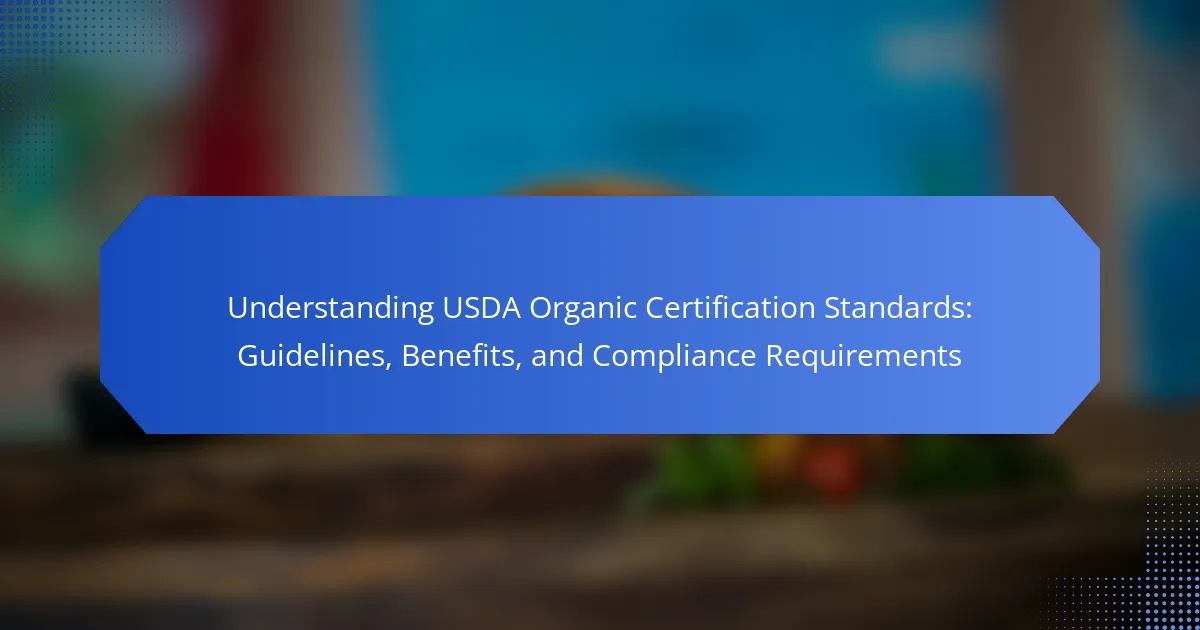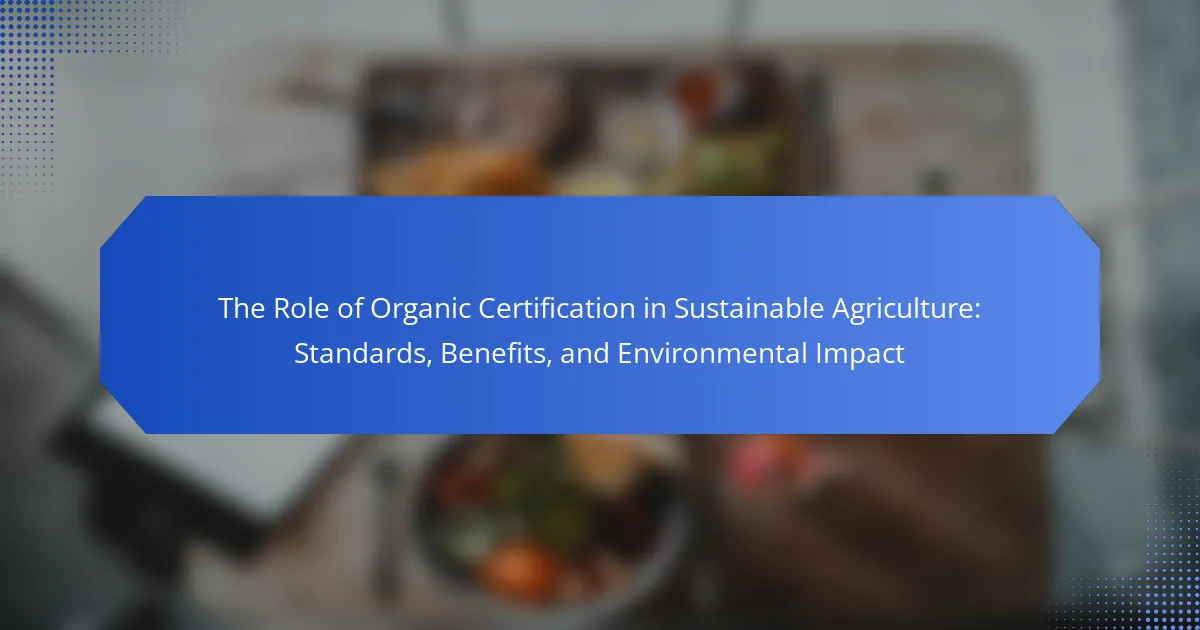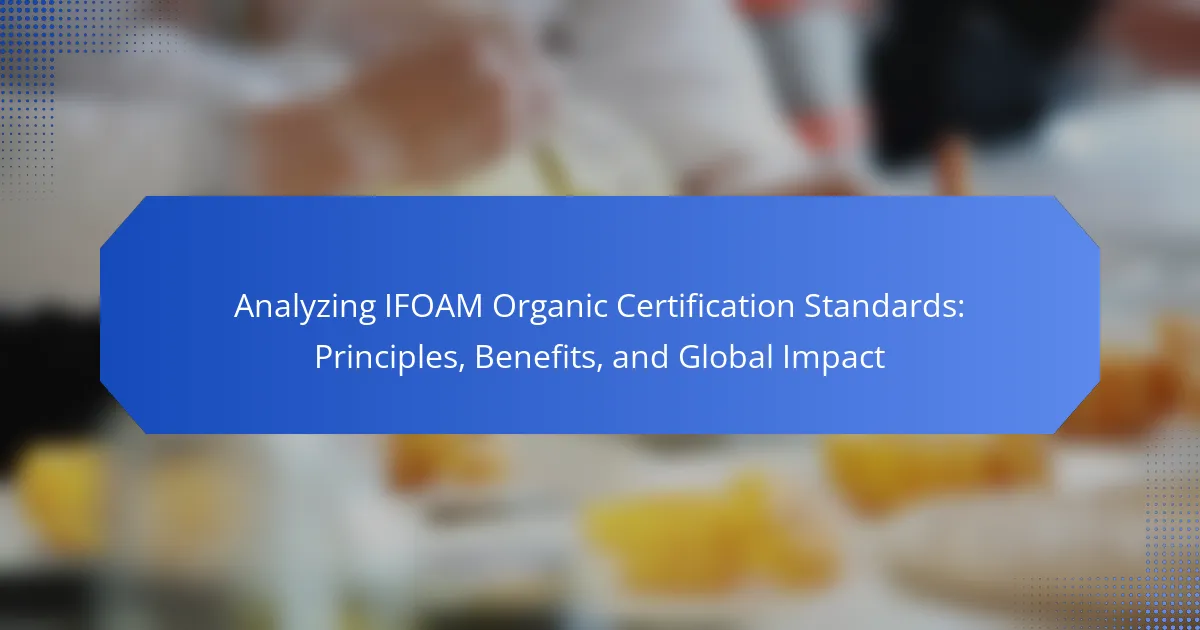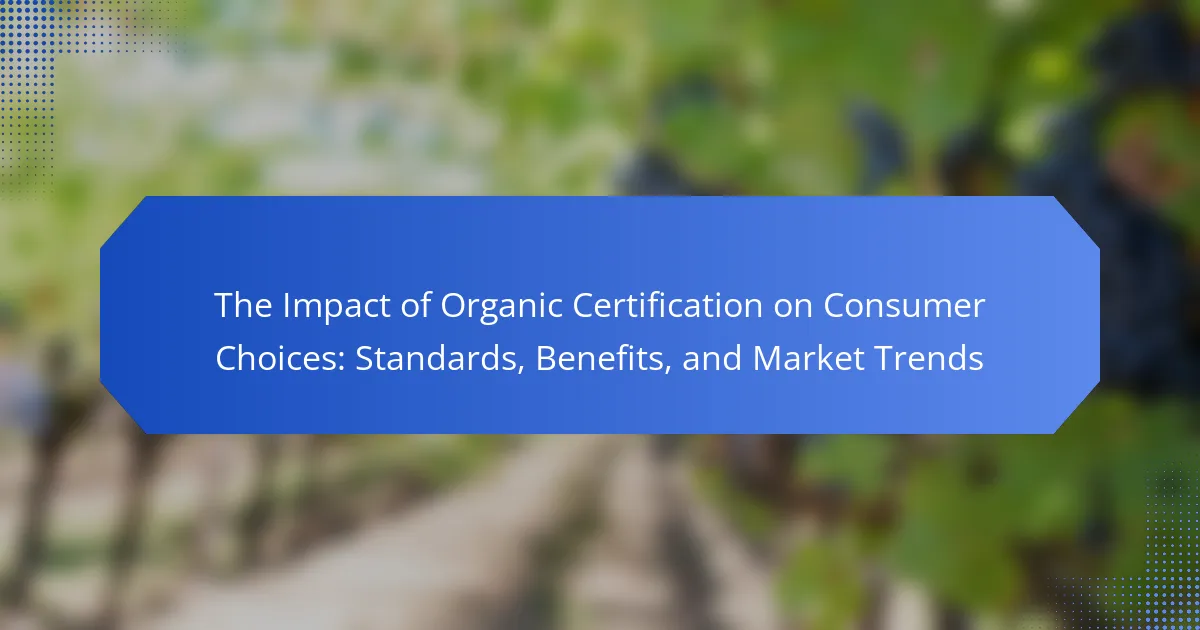Organic certification for food products is a verification process that ensures agricultural products comply with established organic standards, primarily set by regulatory bodies such as the USDA in the United States. This certification guarantees that food is produced without synthetic pesticides, fertilizers, or genetically modified organisms (GMOs). The process involves stringent inspections and thorough documentation of farming practices, requiring farmers to keep detailed records and undergo annual evaluations. Compliance with these organic standards is essential for labeling products as organic, fostering consumer trust in the authenticity of organic food purchases. This article will explore the standards, benefits, and compliance processes associated with organic certification for food products.
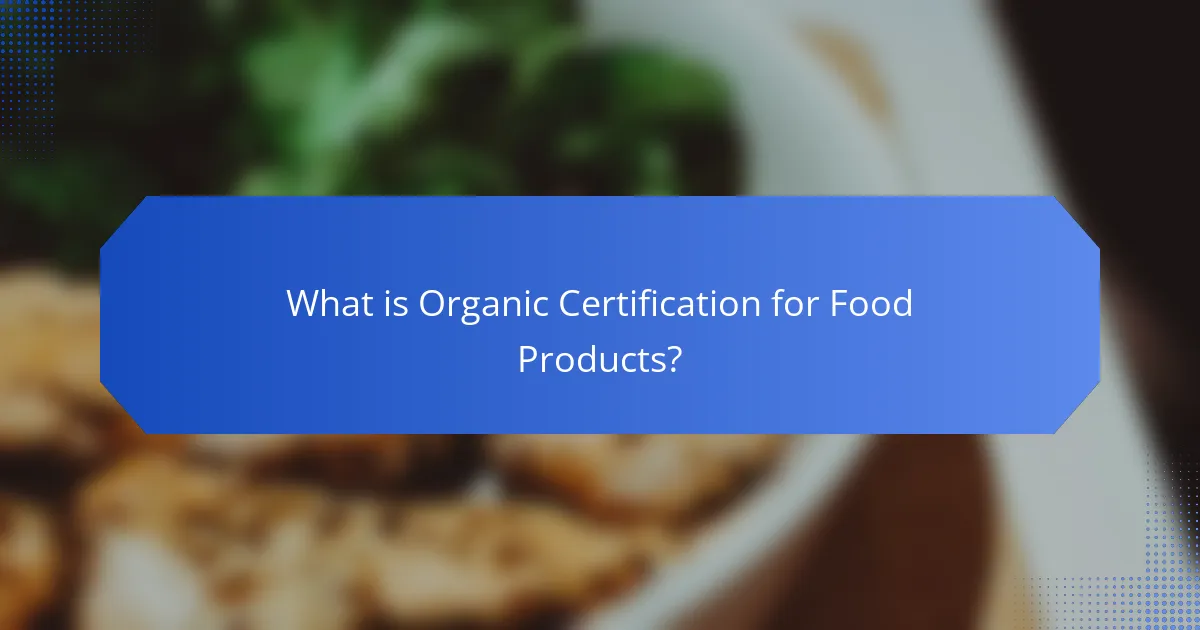
What is Organic Certification for Food Products?
Organic certification for food products is a process that verifies that agricultural products meet specific organic standards. These standards are set by regulatory bodies, such as the USDA in the United States. Organic certification ensures that products are grown without synthetic pesticides, fertilizers, or genetically modified organisms (GMOs). The certification process involves rigorous inspection and documentation of farming practices. Farmers must maintain detailed records of their practices and undergo annual inspections. Compliance with organic standards is crucial for labeling products as organic. This certification helps consumers trust that they are purchasing genuinely organic food.
Why is Organic Certification important for consumers?
Organic certification is important for consumers because it ensures that food products meet specific agricultural standards. These standards prohibit the use of synthetic pesticides and fertilizers. Organic certification also guarantees that animals are raised without antibiotics or growth hormones. Consumers can trust that certified organic products are produced sustainably. Additionally, organic certification often involves regular inspections and testing. This process helps maintain transparency in the food supply chain. According to the USDA, organic farming practices can enhance soil health and biodiversity. Consumers who choose organic products may also support environmentally friendly farming practices.
What does organic certification signify about food quality?
Organic certification signifies that food meets specific production standards. These standards include the absence of synthetic pesticides and fertilizers. Certified organic food must also come from farms that adhere to sustainable practices. This includes crop rotation and maintaining soil health. Furthermore, organic certification ensures that animals are raised without antibiotics or growth hormones. The USDA regulates organic certification in the United States. This regulation provides consumers with assurance regarding food quality. Studies show that organic foods often contain higher levels of certain nutrients.
How does organic certification impact consumer trust?
Organic certification significantly enhances consumer trust in food products. This certification assures consumers that products meet specific organic standards. It involves rigorous inspections and adherence to regulations. Consumers often perceive certified organic products as healthier and more environmentally friendly. Research indicates that 76% of consumers trust organic labels compared to 30% for non-organic labels. This trust is crucial for purchasing decisions. The transparency of the organic certification process fosters confidence in product integrity. As a result, consumers are more likely to choose certified organic products over non-certified alternatives.
What are the key standards for Organic Certification?
The key standards for Organic Certification include adherence to specific agricultural practices. These practices prohibit the use of synthetic pesticides and fertilizers. Organic certification also requires the use of non-GMO seeds. Soil health must be maintained through crop rotation and cover cropping. Livestock must be raised without antibiotics or growth hormones. Organic products must be processed without artificial preservatives. Certification must be conducted by accredited organizations. Compliance with these standards ensures products meet organic labeling requirements.
What specific criteria must food products meet to be certified organic?
Food products must meet specific criteria to be certified organic. They must be grown without synthetic pesticides, herbicides, or fertilizers. The soil must be free from prohibited substances for at least three years before harvest. Organic products cannot be genetically modified. They must be processed without artificial preservatives, colors, or flavors. Additionally, organic livestock must be raised without antibiotics or growth hormones. They must have access to the outdoors and be fed organic feed. Certification is performed by accredited agencies to ensure compliance with these standards.
How do these standards vary by country or region?
Organic certification standards vary significantly by country or region. Each nation has its own regulatory body that sets specific requirements. For example, the USDA regulates organic standards in the United States. In the European Union, the regulations are governed by EU Regulation 2018/848. These standards can differ in terms of allowable substances, farming practices, and labeling requirements.
In Japan, the Japanese Agricultural Standards (JAS) outline their organic certification criteria. Meanwhile, Canada has its own Organic Products Regulations. The differences can affect international trade and market access for organic products. Countries may also have bilateral agreements that recognize each other’s standards. Overall, the diversity in organic certification reflects local agricultural practices and consumer preferences.
What is the compliance process for obtaining Organic Certification?
The compliance process for obtaining Organic Certification involves several key steps. First, an entity must familiarize itself with the organic standards set by the USDA. Next, the entity must develop an organic system plan that outlines practices and procedures for producing organic products. This plan must detail how the entity will comply with organic regulations.
After developing the plan, the entity submits it to a USDA-accredited certifying agent. The certifying agent reviews the plan to ensure it meets all requirements. Following approval, the entity must implement the practices outlined in the plan.
The certifying agent then conducts an on-site inspection to verify compliance. The inspection includes reviewing records and assessing production practices. If the entity passes the inspection, the certifying agent issues an organic certificate.
The entity must maintain compliance with organic standards and undergo annual inspections to retain certification. This process ensures that organic products meet the necessary quality and safety standards.
What steps are involved in the certification process?
The certification process for organic food products involves several key steps. First, the entity seeking certification must select a USDA-accredited certifying agent. Next, the entity submits an application that includes detailed information about their farming practices and products. Following this, the certifying agent conducts an on-site inspection to evaluate compliance with organic standards. After the inspection, the certifying agent reviews the findings and determines whether to grant certification. If approved, the entity receives a certificate and must maintain compliance through annual inspections. Non-compliance can result in suspension or revocation of the certification. These steps ensure that the products meet the strict standards set for organic labeling.
How long does it typically take to achieve organic certification?
Achieving organic certification typically takes three years. This duration is required for land to be free from prohibited substances. The transition period allows for the soil to regain its natural fertility. During this time, farmers must follow organic practices. They must also maintain detailed records of their farming activities. Compliance with organic standards is essential throughout this period. The three-year timeline is a standard set by the USDA. This ensures that products meet organic integrity before certification.
How does the compliance process ensure food safety?
The compliance process ensures food safety by establishing strict standards for organic certification. These standards require producers to follow specific guidelines in growing, handling, and processing food products. Regular inspections and audits are conducted to verify adherence to these guidelines. Non-compliance can result in penalties or loss of certification. Traceability is also a key component, allowing for the tracking of food products from farm to table. This transparency helps identify potential safety issues quickly. Research shows that certified organic products have lower pesticide residues, enhancing consumer safety. The USDA oversees these compliance processes, ensuring consistency and reliability in food safety.
What are the benefits of Organic Certification for producers?
Organic certification provides producers with enhanced market access and consumer trust. It allows them to sell products at premium prices. Organic certification also opens opportunities in niche markets. Certified organic products often attract health-conscious consumers. The certification process encourages sustainable farming practices. Producers benefit from improved soil health and biodiversity. Studies show that organic farms can yield higher profits over time. Additionally, organic certification helps producers comply with regulatory standards.
How does organic certification affect market access for producers?
Organic certification significantly enhances market access for producers. It allows them to tap into a growing consumer demand for organic products. Certified organic products often command higher prices in the market. This price premium can lead to increased profitability for producers. Additionally, many retailers and distributors prefer sourcing certified organic goods. This preference opens up new distribution channels for certified producers. A study by the USDA shows that organic sales have consistently increased over the years. In 2021, organic food sales reached $61.9 billion in the U.S., reflecting strong consumer interest. Thus, organic certification is crucial for producers seeking to expand their market presence.
What financial advantages can certified organic producers expect?
Certified organic producers can expect higher market prices for their products. Research indicates that organic produce typically sells for 20% to 100% more than conventional items. This price premium enhances profitability for certified producers. Additionally, organic certification can open access to niche markets. These markets often have less competition and loyal customer bases. Certified organic producers may also benefit from government subsidies and grants. Various programs support organic farming initiatives financially. Furthermore, consumer demand for organic products continues to rise. This trend can lead to increased sales and market share for certified producers.
What challenges do producers face in achieving Organic Certification?
Producers face several challenges in achieving Organic Certification. Compliance with stringent regulations is a primary obstacle. These regulations require detailed record-keeping and documentation of farming practices. Producers must also manage soil health and pest control without synthetic chemicals. This can lead to increased labor and costs. Transition periods can last three years, during which producers must maintain organic practices without selling their products as organic. Additionally, understanding the certification process can be complex and time-consuming. Financial constraints also pose a challenge, as certification fees can be significant for small producers.
What common obstacles hinder the certification process?
Common obstacles that hinder the certification process include a lack of understanding of organic standards. Producers often struggle to interpret the specific requirements set by certifying bodies. Insufficient documentation is another significant barrier. Many applicants fail to provide the necessary records to demonstrate compliance. Financial constraints can also impede the process. The costs associated with certification can be prohibitive for small-scale farmers. Additionally, time constraints pose a challenge. The certification process can be lengthy, discouraging some applicants. Lastly, inconsistent practices among producers can lead to complications. Variability in adherence to organic practices can result in delays or rejections.
How can producers overcome these challenges?
Producers can overcome challenges in organic certification by implementing clear strategies. They should invest in training programs to understand certification requirements. Utilizing technology can streamline compliance processes and documentation. Collaborating with experienced consultants can provide valuable insights into best practices. Establishing strong relationships with certifying agents can facilitate smoother communication. Regularly reviewing and updating practices ensures adherence to evolving standards. Engaging in community forums can offer support and shared experiences among producers. These strategies collectively enhance producers’ ability to navigate certification challenges effectively.
What are the future trends in Organic Certification for Food Products?
Future trends in organic certification for food products include increased transparency and traceability. Consumers demand more information about the sources of their food. Blockchain technology is being explored to enhance supply chain transparency. Additionally, there is a growing emphasis on regenerative organic practices. These practices focus on soil health and biodiversity. Certification bodies are likely to adapt standards to include these practices. Furthermore, digital tools for certification processes are becoming more prevalent. These tools streamline compliance and reduce administrative burdens. Finally, consumer education on organic standards is expected to rise. This will empower consumers to make informed choices about organic products.
What practical tips can help producers navigate the Organic Certification process?
Producers can navigate the Organic Certification process by understanding the requirements thoroughly. Familiarize yourself with the USDA National Organic Program standards. Maintain detailed records of all farming practices and inputs used. Select a reliable certifying agent who understands your specific operation. Attend workshops or training sessions on organic practices and certification. Develop a comprehensive organic system plan that outlines your practices. Ensure compliance with any state-specific organic regulations. Regularly review and update your practices to align with organic standards. These steps can streamline the certification process and improve your chances of success.
Organic certification for food products is a verification process ensuring that agricultural products comply with specific organic standards set by regulatory bodies such as the USDA. This article outlines the importance of organic certification for consumers, the key standards required for certification, and the compliance process involved in obtaining it. Additionally, it highlights the benefits for producers, including market access and financial advantages, as well as the challenges they may face during certification. Future trends in organic certification and practical tips for navigating the process are also discussed, providing a comprehensive overview of the topic.
